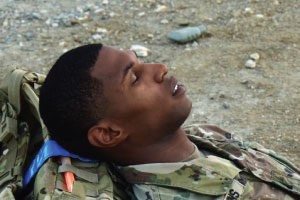By Tim Hoyt, Ph.D.
May 4, 2020
 U.S. Air Force photo by Staff Sgt. Caitlin Conner
U.S. Air Force photo by Staff Sgt. Caitlin Conner
One of the hallmarks of sleep hygiene education is the instruction to "avoid taking naps." The idea is that avoiding naps will help to keep a consistent circadian rhythm and ensure that you feel tired when it's time to go to bed. However, most of the sleep hygiene instruction that mental health providers give their patients is difficult to implement in combat, deployed, or field training environments. Suggestions like "get 7–8 hours of uninterrupted sleep," "make sure you sleep in a quiet, cool, and dark place," and "keep your sleep routine the same" often don't work when you're in a deployed location.
I had a battle buddy when I was in Afghanistan who was the master of taking naps. He knew that either the medics or the mortars were going to wake him up at all times of the night, and his motto was "nap whenever you can!" Somewhere in-between "avoid taking naps" and "nap whenever you can" is an effective zone that might facilitate improved sleep in disrupted settings. Let's look at the science of napping to see if it's really possible to take "tactical naps" that might be beneficial in field and tactical military environments.
There's been some interesting research on napping during the past few decades. Most of this research comes from civilian studies of nurses who work the night shift, aviation crews on long flights or 24-hour duty cycles, and truck drivers napping during long hauls. Reviews of these studies suggest the following:
Tactical Napping: Most participants in studies of napping are able to fall asleep during a planned nap opportunity, and will sleep for the majority of the allotted time. In deployed environments when you are not getting regular sleep, planned napping is recommended.
Napping During the Night Shift: Scheduled napping during a night shift can improve reaction time, reduce sleepiness, and improve memory. The strongest effects occurred when naps were scheduled approximately half to two-thirds of the way through a night shift. Planned napping during night shifts and watches is worth a conversation with the chain of command. These should be for 30 minutes (see below).
Nap Duration: Most of the benefits associated with napping came from naps that last between 30–40 minutes. Naps that last longer (60–120 minutes) can result in "sleep inertia" that causes performance to match groups who did not nap. This is typically caused by waking in a more advanced stage of the sleep cycle.
Sleep Inertia: After napping, many individuals can experience sleep inertia or grogginess after waking up from a nap. Shorter naps usually show less sleep inertia. A recent study from the Walter Reed Army Institute of Research suggested that chewing a 100mg dose of caffeinated gum can be effective in correcting sleep inertia in the 20 minutes after waking from a nap. However, keep in mind that more than 250mg of caffeine in a day will contribute to insomnia.
Duration of Benefits: Meta-analysis suggests that napping can potentially reduce the effects of sleep deprivation for up to 10 hours. However, studies also show that a nap during a night shift is never sufficient to make up for working all night.
In sum, naps are almost always effective when severe or ongoing sleep disruption is predicted, particularly in operational settings. Naps are most effective when planned and brief. These findings notwithstanding, command commitment to a predictable sleep cycle in field and deployed settings is still the best approach to alleviating sleep problems and the operational effects of fatigue. The minor benefits of naps pale in comparison to the benefits of a consistent sleep cycle. And of course, if things are too kinetic and sleep opportunities unpredictable or rare, then sleep whenever and wherever you can.
Dr. Hoyt is a former Army psychologist who is chief of Psychological Health Promotion and supervisor of the Combat and Operational Stress Control mission at the Psychological Health Center of Excellence.